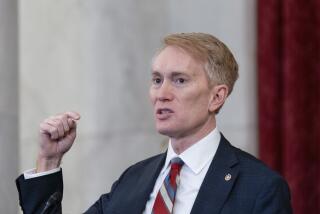U.S. Talks of Compromise but Pushes for Lifting of Iraq Sanctions
BERLIN â Secretary of State Colin L. Powell said Thursday that the U.S. might support a compromise in the draft U.N. resolution on Iraq that would allow the temporary suspension of sanctions, instead of the unequivocal lifting of them.
âThe idea of suspending rather than lifting sanctions has been raised by a number of Security Council members,â Powell told reporters in the Bulgarian capital, Sofia. âWe think it is much cleaner to lift the sanctions, but as part of the discussion-and-negotiations process we will look at the idea of initially suspending sanctions.â
On an airplane traveling back to Berlin later Thursday, however, Powell told reporters that Washington had not given up on its aim to lift the embargo without conditions. âWeâre going for lifting of sanctions. We want to get a 15-0 vote like we did with Resolution 1441,â last fallâs U.N. measure that gave Iraq âa final chanceâ to disarm. âI think itâs achievable,â said Powell, who had stopped in Bulgaria to thank the government for its support during the war in Iraq.
A senior State Department official, speaking on condition of anonymity, said the United States was willing to listen to key Security Council members but had not committed to any deal.
White House spokesman Scott McClellan dismissed the notion of a temporary suspension. âWith the regime gone, there is no reason to do anything other than lift the sanctions so that the Iraqi people can become fully integrated into the global economy,â he said. âWe believe the sanctions should be lifted ... and we will continue to press forward to lift those sanctions.â
At the U.N., the Bush administration presented a new resolution on lifting sanctions against Iraq that expanded the role the world organization would play during the postwar period. The U.S. is seeking a vote on the measure next week.
The new proposal gives a âspecial coordinator,â to be appointed by U.N. Secretary-General Kofi Annan, additional advisory duties, but the U.S. and Britain would retain broad powers until Iraqis can freely determine their political future.
The new draft also suggests that Iraqâs debt to other governments be resolved through institutions such as the Paris Club, a group of 19 sovereign creditors that includes the U.S., Britain, France, Germany, Italy and Russia. A U.S. official said the provision was designed to show that the U.S. doesnât want to oversee how Iraqâs debts are repaid.
Richard Grenell, the spokesman for U.S. Ambassador John D. Negroponte, said, âWe have spent several days listening to the council comments to improve the text.â Many of the suggestions were incorporated into the new text, he said.
Some nations saw the new draft as moving in the right direction, but others said major issues remained. âThere are some things that are positive, but the real sensitive issues are still there,â said Fayssal Mekdad, Syriaâs deputy permanent envoy.
The representative of another Muslim nation noted that the United States and Britain are likely to be in Iraq for a long time. As a result, several nations wanted language in the resolution that would allow them to assist in the countryâs rebuilding without appearing to be part of an occupation force.
The United States is eager to ease sanctions quickly because Iraqi oil production since the war ended has been better than anticipated and refineries are rapidly filling. Failure to win international agreement by next week would crimp Iraqâs production and export of oil, hurting the potential to earn badly needed income for reconstruction.
âThe important thing is to be able to begin moving oil out of Iraq in due course in order to generate revenue for the Iraq people to benefit them solely -- and also to make sure that the refineries keep running so that ... oil products that are needed by the people can be produced by the refineries,â Powell said.
âWe will see what the argument is for suspending sanctions and see if that makes any sense. But our preference is to lift, and that is why we put it in the resolution that way.â
The secretary, in Berlin for the last leg of a weeklong tour of the Middle East and Europe, is scheduled to discuss Iraq policy and the U.N. resolution with German officials today. Germany is a key elected member of the Security Council. Although the country does not have veto power on the council, Chancellor Gerhard Schroeder was among the most outspoken critics of the U.S. campaign to topple the regime of Saddam Hussein.
In Paris, a top State Department official said Thursday that he was âfairly optimisticâ that France, which led the opposition to an Iraq war, was willing to find common ground on the most sensitive postwar issue to date.
*
Wright reported from Berlin and Goldman from the United Nations. Times staff writer Sonni Efron in Washington contributed to this report.
More to Read
Get the L.A. Times Politics newsletter
Deeply reported insights into legislation, politics and policy from Sacramento, Washington and beyond. In your inbox three times per week.
You may occasionally receive promotional content from the Los Angeles Times.










